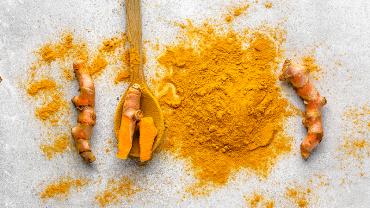
There are only a few natural products that have demonstrated the wide range of protective properties such as curcumin. Turmeric has three main bioactive components: curcumin, desmethoxycurcumin and bisdemethoxycurcumin. These curcuminoids have many biological effects including anti-inflammatory, antioxidant, antitumor, antibacterial and antiviral properties.
According to a new review published last week, researchers investigated the benefits of turmeric supplementation in chronic skin conditions. The skin is the largest organ in the body, however, dysregulation of the immune system can lead to inflammatory skin conditions. The current medications available are limited, have varying effectiveness, and they can have adverse effects.
This review consisted of 11 human clinical trials that included 378 participants. The skin conditions investigated include psoriasis, pruritus, oral lichen planus, facial redness and several skin cancers. The duration of the studies ranged from 4 to 12 weeks with dosages ranging from 500 mg to 5 grams per day. Overall, there were therapeutic benefits for skin health as a result of turmeric supplementation.
A study of 21 patients with moderate-to-severe plaque psoriasis received 600 mg of turmeric supplementation during an 8-week period combined with ultraviolet phototherapy and visible light. At the end of the study, more than 95% of the patients had >75% reduction in the Psoriasis Area Severity Index (PASI). Another study of 15 patients with psoriasis who were already being treated with acitretin were given 3 g of curcumin per day in divided doses for 12 weeks. Both groups showed a reduction in PASI values, however, the results were more significant in the curcumin group. In a smaller of study of only 8 patients, they were also treated with curcumin at 1,500 mg in divided doses for 12 weeks in combination with medication demonstrating up to an 88% improvement by the end of the study.
Pruritis is another common skin condition that can lead to a significantly reduced quality of life. A study of 100 patients with uremic pruritis received 1,500 mg of curcumin in divided doses for an 8-week period. As a result, there was a significant reduction in pruritis scores and high-sensitivity C-reactive protein levels compared to the placebo group. Two additional studies yielded similar results, suggesting curcumin should be considered as inexpensive alternative treatment for chronic pruritis.
Research also suggests that facial redness improved with turmeric supplementation. A study of 30 patients were given a polyherbal product containing curcumin during a 4-week period. In conclusion, there was a 40% reduction in facial redness and a decrease in intensity and distribution.
Turmeric supplementation was also investigated in the treatment of oral lichen planus. This is a common chronic inflammatory condition that affects the mucous membranes of the mouth. A small study of 20 patients received C3 curcumin complex at 6 g or a placebo for 12 days. The curcuminoid group demonstrated a greater reduction in clinical signs and symptoms compared to the placebo group, as well as an improvement in the Modified Oral Mucositis Index score.
There were also two studies that investigated the chemopreventative effects of turmeric against skin cancer. Dosing was given at 500 mg per day, increasing up to 12 g per day. A dose-dependent effect was also observed at almost all dose levels, which demonstrated a significant reduction in the number and volume of cutaneous neurofibromas.
These individuals are in a chronic disease state and have increased demands than what could be obtained from the diet alone; therefore, dietary supplements should be considered to help decrease disease severity. Other nutrients to consider include collagen, fish oil and probiotics.
By Michael Jurgelewicz, DC, DACBN, DCBCN, CNS